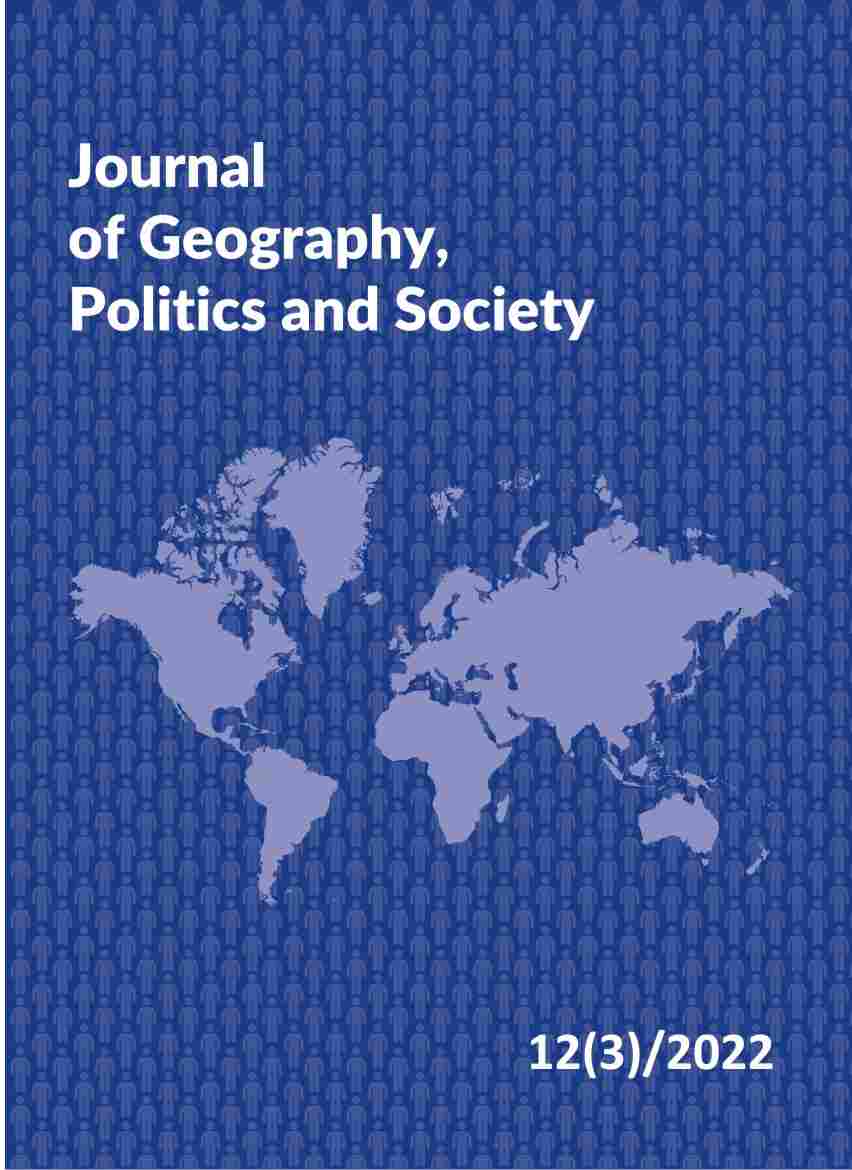The national security field under conditions of armed aggression of the Russian Federation against Ukraine in 2022
DOI:
https://doi.org/10.26881/jpgs.2022.3.05Keywords:
security, security space, international (global) security, national security, military security, information securityAbstract
This article touches upon the problem of organizing security space under the conditions of armed aggression of the Russian Federation against Ukraine in 2022. According to the understanding of the “security” concept, it is determined that the security space should put a state and its vital interests under protection from any internal and external threats. It is emphasized that in conditions of armed aggression, the central components of the security space should be international (global) security and national security. The main areas of international (global) security should include the development and control of weapons, the fight against international terrorism, the development by the international community of effective mechanisms for countering modern global security challenges (proliferation of mass destruction weapons, namely nuclear weapons). Inclusion of military, state, information and cyber security is proposed as the main areas of national security.
Downloads
References
Bojko Ì.Ì., 2010, Viznačennâ agresìï v mìžnarodnomu pravì (Eng. Definition of aggression in international law), Vìsnik Akademìï advokaturi Ukraïni, 1(17)/2010, 178–179.
Černâk N.P., Pervìj V.Û.,2019, Ŝodo ponâttâ nacìonal’noï bezpeki (Eng. Regarding the concept of national security), [in:] Mìžnarodna ta nacìonal’na bezpeka: teoretičnì ì prikladnì aspekti: mater. III Mìžnar. nauk.-prakt. konf. (m. Dnìpro, 15 ber. 2019 r.), (Eng. international and national safety: theoretical and applied aspects: materials of the 3rd international scientific and practical conference (Dnipro, 15 March 2019), Dnìpopetrovs’kij deržavnij unìversitet vnutrìšnìh spraw, Dnìpro, 52–53.
Ciganov V.P., 2006, Polìtična bezpeka ì bezpečna polìtika: skladovì, oznaki, stan, tendencìï (Eng. Political security and safe politics: components, signs, state, trends), Nìka centr, Kiïv.
Danik Û.G., 2008, Aktual’nì pitannâ rozvitku mìžnarodnoï bezpeki (Eng. Current issues of international security development), Aktual’nì problemi deržavnogo upravlìnnâ, 2/2008, 284–295.
Doronìn Ì.M., 2020, Nacìonal’na bezpeka Ukraïni v ìnformacìjnu epohu: teoretiko-pravove doslìdžennâ (Eng. National security of Ukraine in the information age: a theoretical and legal study), Disertacìâ, Kiïv.
Europol, 2021, Internet Organised Crime Threat Assessment (IOCTA) 2021, https://www.europol.europa.eu/publications-events/main-reports/internet-organised-crimethreat-assessment-iocta-2021 (accessed 04 April 2022).
Interpol, 2018, Cybercrime is entering a new dimension, https:// edition.cnn.com/search?q=+Interpol%3A+Cybercrime+i s+entering+a+new+dimension (accessed 04 April 2022).
Kìl’kìst’ bìžencìv z Ukraïni pereviŝila 3,5 mìl’joni – OON (Eng. The number of refugees from Ukraine has exceeded 3.5 million - UN), Ukrìnform, https://www.ukrinform.ua/ rubric-ato/3436732-kilkist-bizenciv-z-ukraini-perevisila35-miljona-oon.html (accessed 01 April 2022).
Kìl’kìst’ kìberzločinìv v Ukraïnì v 2021 rocì zrosla na 25%. (Eng. The number of cybercrimes in Ukraine increased by 25% in 2021), PBK-Ukraïna, https://www.rbc.ua/ukr/news/kolichestvo-kiberprestupleniy-ukraine-2021-1622012394. html (accessed 04 April 2022).
Makinda S.M., 1998, Sovereignty and Global Security, Security Dialogue, 29(3), 281–292.
Malloch-Brown M., 2022, Opinion: This is the moment to reset our multilateral institutions, Devex, https://www.devex. com/news/opinion-this-is-the-moment-to-reset-ourmultilateral-institutions-103120 (accessed 19 July 2022).
Mìžnarodnij centr perspektivnih doslìdžen’, 2019, Ocìnka bezpekovih viklikìv ta ïh naslìdkìv dlâ zovnìšn’oï polìtiki Ukraïni pìslâ viborìv (Eng. Assessment of security challenges and their consequences for the foreign policy of Ukraine after the elections), http://icps.com.ua/assets/uploads/images/files/zovn_pol_kandidats_a4_v01.pdf (accessed 04 April 2022).
Mizutori M., 2021, A World in Crisis Needs International Cooperation, United Nations, https://www.un.org/en/unchronicle/world-crisis-needs-international-cooperation (accessed 19 July 2022).
Opredelenie agressii Utverždeno rezolûciej 3314 (XXXIX) General’noj assamblei OON ot 14 dekabrâ 1974 goda (Eng. Definition of aggression: Approved by General Assembly resolution 3314 (XXIX) of December 14, 1974), 1974, https://www.un.org/ru/documents/decl_conv/conventions/aggression.shtml (accessed 03 April 2022).
Philipps L., Braun D., 2020, Die Zukunft des Multilateralismus. Die liberale Ordnung unter Druck (Eng. The future of multilateralism. The liberal order under pressure), Auslandsinformationen, 3/2020, 16–29, https://www.kas.de/documents/259121/10240919/Die+Zukunft+des+Multilateral ismus.pdf/7521545d-f234-5bd8-7384-c3a5784cfba6?ver sion=1.0&t=1601544575428 (accessed 19 July 2022).
Smolianiuk V.F., 2016, 6.4. Viznačal’nì činniki formuvannâ geostrategìï Ukraïni (Eng. 6.4. Determining factors of formation of geostrategy of Ukraine), [in:] G.P. Sitnik (ed.), 2016, Global’na ta nacìonal’na bezpeka. Pìdručnik (Eng. Global and national security. Textbook), NADU, Kiïv, 333–354.
Sosnìn O., 2021, Rozumìnnâ sutnostì nacìonal’noï bezpeki: svìtoglâdno-ponâtìjnì j naukovo-teoretičnì zasadi (častina 1) (Eng. Understanding the essence of national security: worldview-conceptual and scientific-theoretical foundations (fragment)), LexInform, https://lexinform.com.ua/ dumka-eksperta/rozuminnya-sutnosti-natsionalnoyibezpeky-svitoglyadno-ponyatijni-j-naukovo-teoretychni-zasady-chastyna-1/ (accessed 02 April 2022).
Ukaz Prezident Ukraïni vìd 28.12.2021 № 685/2021 Pro rìšennâ Radi nacìonal’noï bezpeki ì oboroni Ukraïni vìd 15 žovtnâ 2021 roku «Pro Strategìû ìnformacìjnoï bezpeki» (Eng. Decree of the President of Ukraine dated December 28, 2021 No. 685/2021 On the decision of the National Security and Defense Council of Ukraine dated October 15, 2021 “On Information Security Strategy”), https://www.president.gov.ua/documents/6852021-41069 (accessed 02 April 2022).
Za ostannì p’ât’ rokìv kìl’kìst’ kìberzloèinìv v Ukraïnì zrosla vdvìčì (Eng. Over the past five years, the number of cybercrimes in Ukraine has doubled), 2019, Opendatabot, https:// opendatabot.ua/analytics/374-hackers (accessed 03 April 2022).
Zakon Ukraïni «Pro nacìonal’nu bezpeku Ukraïni» (Eng. Law of Ukraine “On National Security of Ukraine”), 2018, https:// zakon.rada.gov.ua/laws/show/2469-19#Text (accessed 03 April 2022).
Zakon Ukraïni «Pro osnovi nacìonal’noï bezpeki Ukraïni» (Eng. Law of Ukraine “On the Basics of National Security of Ukraine”) vìd 19.06.2003 № 964-IV.
Vìdomostì Verhovnoï Radi Ukraïni. 2003. № 39. St. 351.
Zakon Ukraïni «Pro Osnovnì zasadi rozvitku ìnformacìjnogo suspìl’stva v Ukraïnì na 2007–2015 roki» (Eng. Law of Ukraine “On Basic Principles of Information Society Development in Ukraine for 2007-2015”), https://zakon.rada. gov.ua/laws/show/537-16#Text (accessed 02 April 2022).

 Academic Scientific Journals
Academic Scientific Journals




